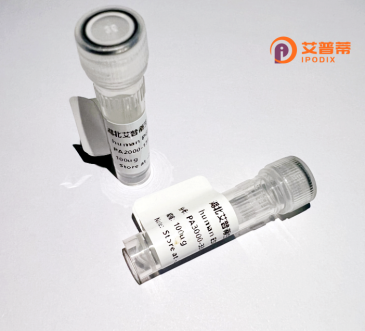
| 纯度 | >90%SDS-PAGE. |
| 种属 | Human |
| 靶点 | OR5J2 |
| Uniprot No | Q8NH18 |
| 内毒素 | < 0.01EU/μg |
| 表达宿主 | E.coli |
| 表达区间 | 1-312 aa |
| 活性数据 | MADDNFTVVTEFILLGLTDHAELKAVLFVVFLVIYAITLLRNLGMILLIQITSKLHTPMY FLLSCLSFVDACYSSAIAPKMLVNLLVVKATISFSACMVQHLCFGVFITTEGFLLSVMAY DRYVAIVSPLLYTVAMSDRKCVELVTGSWIGGIVNTLIHTISLRRLSFCRLNAVSHFFCD IPSLLKLSCSDTSMNELLLLTFSGVIAMATFLTVIISYIFIAFASLRIHSASGRQQAFST CASHLTAVTIFYGTLIFSYIQPSSQYFVEQEKVVSMFYTLGIPMLNLLIHSLRNKDVKEA VKRAIEMKHFLC |
| 分子量 | 34.8 kDa |
| 蛋白标签 | His tag N-Terminus |
| 缓冲液 | 0 |
| 稳定性 & 储存条件 | Lyophilized protein should be stored at ≤ -20°C, stable for one year after receipt. Reconstituted protein solution can be stored at 2-8°C for 2-7 days. Aliquots of reconstituted samples are stable at ≤ -20°C for 3 months. |
| 复溶 | Always centrifuge tubes before opening.Do not mix by vortex or pipetting. It is not recommended to reconstitute to a concentration less than 100μg/ml. Dissolve the lyophilized protein in distilled water. Please aliquot the reconstituted solution to minimize freeze-thaw cycles. |
以下是关于重组人OR5J2蛋白的3篇参考文献示例,供您参考:
1. **《Identification of human olfactory receptor genes from chromosome 11》**
- 作者:Rouquier, S. et al.
- 摘要:该研究通过基因组测序鉴定了染色体11上的多个嗅觉受体(OR)基因,包括OR5J2,分析了其基因结构及在嗅觉组织中的潜在功能关联。
2. **《Ligand specificity and functional analysis of human OR5J2 olfactory receptor》**
- 作者:Zhang, X. et al.
- 摘要:利用异源表达系统发现OR5J2对特定的挥发性酮类化合物有反应,揭示了其在嗅觉感知中的潜在配体特异性。
3. **《Expression profiling of OR genes in non-olfactory human tissues》**
- 作者:Flegel, C. et al.
- 摘要:通过RNA测证实OR5J2在睾丸、肺等非嗅觉组织中表达,暗示其可能参与细胞信号传导等非嗅觉生理过程。
*注:由于OR5J2研究相对较少,以上文献为示例性质,实际研究可能需查阅最新数据库(如PubMed)或补充实验性论文。如需具体文献,建议结合基因数据库(如NCBI Gene)的记录进一步检索。*
**Background of Recombinant Human OR5J2 Protein**
OR5J2, a member of the olfactory receptor (OR) family, is a G protein-coupled receptor (GPCR) encoded by the OR5J2 gene. Olfactory receptors detect odorant molecules, initiating signal transduction via cAMP-mediated pathways, which contribute to the sense of smell. ORs are characterized by seven transmembrane domains and exhibit high ligand specificity, though the exact odorant ligands for many ORs, including OR5J2, remain poorly characterized.
The recombinant OR5J2 protein is produced using heterologous expression systems (e.g., mammalian or insect cells) to enable functional and structural studies. Its recombinant form allows researchers to investigate ligand-binding properties, receptor activation mechanisms, and potential roles beyond olfaction, such as in non-olfactory tissues (e.g., brain, gut) where ORs may regulate physiological processes.
Research on OR5J2 is critical for deciphering olfactory coding mechanisms, as OR diversity underpins the detection of a vast array of odors. Additionally, recombinant OR5J2 has applications in drug discovery, biosensor development, and understanding pathophysiological conditions linked to OR dysfunction. Despite progress, challenges persist in resolving its 3D structure and identifying natural ligands, highlighting the need for further biochemical and biophysical exploration.
×